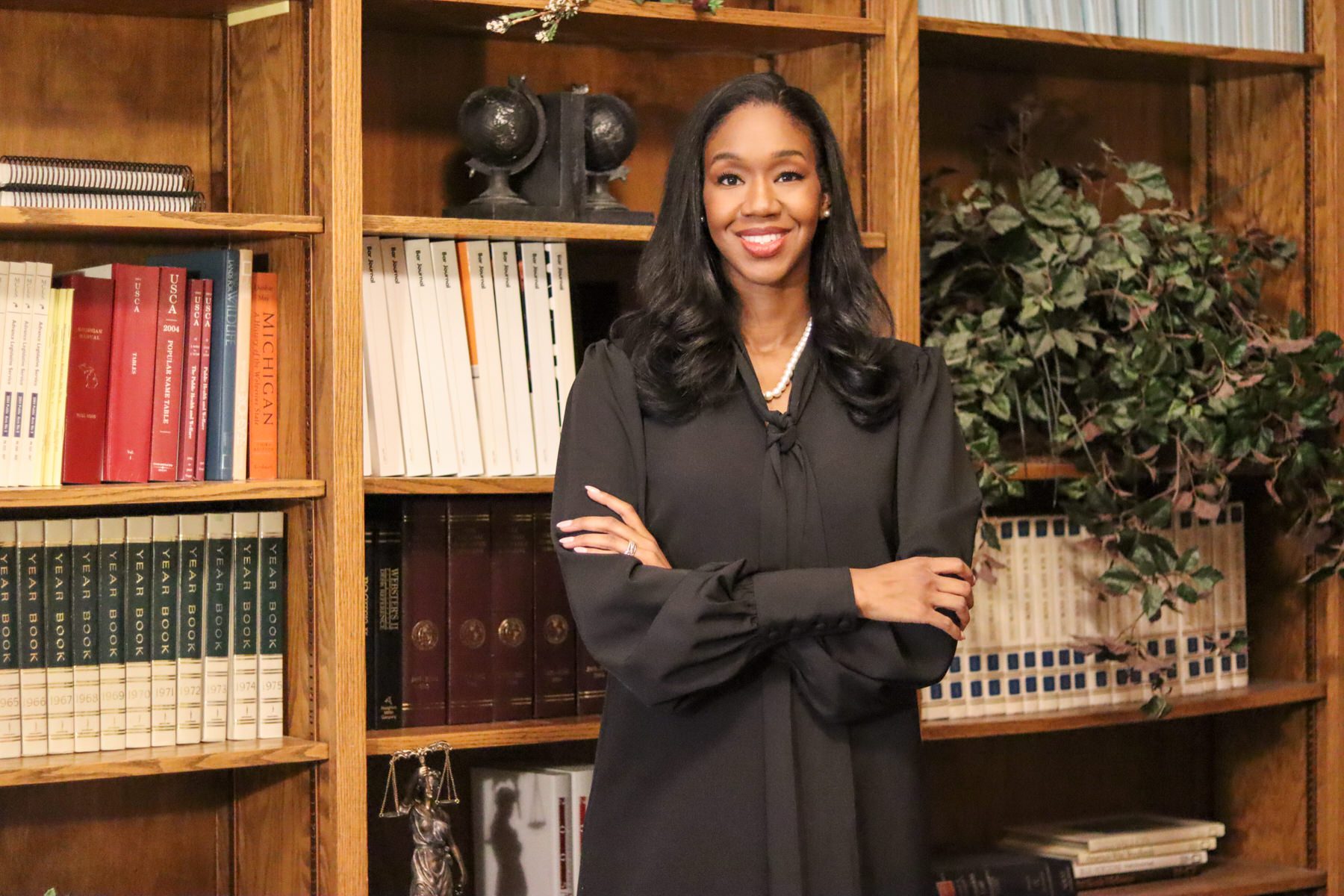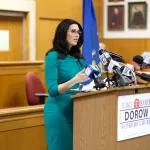In August, Michigan state Rep. Kyra Harris Bolden enthusiastically took the stage at a convention to accept the Democratic nomination for state Supreme Court. It was just six days after she gave birth.
“I did not raise my hand initially to run for Michigan Supreme Court and be pregnant,” Bolden, holding her now eight-week-old daughter Emerson, told The 19th in an October interview. “That was not on my radar.”
Bolden, a lawyer and litigator by training, will now make history as the first Black woman to serve on Michigan’s seven-member high court, which currently has no Black justices.
Bolden, who was first elected in 2018 to a state House seat in the Detroit suburbs, lost her campaign for the state Supreme Court. But Gov. Gretchen Whitmer announced Tuesday, two weeks after the midterm elections, that she would appoint Bolden to a seat opened up by Justice Bridget Mary McCormack’s retirement from office.
“I left a very safe Democratic seat that I would have, most likely, won an easy election for. But the stakes couldn’t be higher,” Bolden told The 19th about her run. “It was when I was safely in my second trimester that I thought, ‘I can do more, and I can’t sit on the sidelines.’”
In Michigan, a critical battleground state, abortion access and threats to American democracy were at the forefront of its most competitive races for governor, attorney general and secretary of state. Those issues also shaped the technically nonpartisan races for state Supreme Court. In Michigan and around the United States, long-overlooked state courts now wield more power than ever before in shaping American law — and outside interests are putting more resources toward influencing who gets on the bench.
Nearly a quarter of the nation’s state supreme court seats were on the ballot in some form in 2022, either in direct partisan elections, nonpartisan elections or retention elections, where voters faced a yes-no choice of whether to keep an appointed justice on the bench.
Abortion and the fallout from contentious redistricting litigation also loomed large in state supreme court races in the battlegrounds of Ohio and North Carolina.
Abortion factored into state supreme court races in reliably red states, too. A GOP state lawmaker behind Kentucky’s abortion ban and an anti-abortion constitutional amendment on the ballot in November lost his campaign for a seat on the state Supreme Court. And in Kansas, where voters earlier this year rejected a similar amendment, six out of seven of state Supreme Court justices are up for retention elections.
-
More from The 19th
- Using campaign funds for child care is legal — but Herschel Walker is using it as an attack
- ‘People underestimated them’: Advocates for Black women in politics want the Democratic Party to learn from the midterms
- Most media predicted a red wave. Here’s how The 19th got the election right.
In Michigan, the stakes of the race are enormous.
“All eyes are on Michigan, and a lot of eyes are on our state supreme court races,” Ashlea Phenicie, a spokeswoman for Planned Parenthood Action Michigan, said.
The U.S. Supreme Court overturning the federal protections in Roe v. Wade made state supreme courts the final authority on abortion access in each state.
In Michigan, abortion is accessible only because the state Supreme Court blocked the enforcement of the state’s old abortion ban enacted in 1931. State courts have also put strict abortion bans on hold in the neighboring states of Indiana and Ohio.
Michigan’s high court also stepped in after the state’s top election board deadlocked on certifying two constitutional amendments. The court ruled to allow the measures, one establishing an affirmative right to abortion and reproductive rights into the state constitution and another enshrining a slew of voting rights measures, to appear on the November ballot. Both measures passed by comfortable margins.
“Part of our job is making sure that people are aware of how the Michigan Supreme Court will affect their daily lives going forward, and honestly, generations to come,” Bolden said. “Whether or not you’re able to vote on a particular ballot petition doesn’t just affect the people of today.”
To Michigan progressives and abortion advocates, Bolden was precisely the kind of candidate that they hoped could break through and draw voters’ attention — not just to the election at the very top of the ticket, but for judicial races and two highly watched ballot initiatives, on abortion and voting rights.
“We’ve been excited about all of our state Supreme Court candidates that we’ve had in the past, but Kyra is especially awesome,” said Lonnie Scott, executive director of Progress Michigan, a hub for progressive activism in the state. “The progressive community is very excited about her candidacy.”
Since the Supreme Court overturned Roe v. Wade, Planned Parenthood clinics in Michigan have seen two to three times the number of patients per week due to restrictions in many neighboring states, Phenicie said. That means the fate of abortion patients not just in Michigan but around the Midwest may rest with the state Supreme Court.
“Abortion access has risen to the top of people’s priority list,” she said. “A lot of folks thought that Roe would never fall, and now that it has, they’re frankly pretty angry and motivated to get involved.”
“It is incredibly important to abortion rights, not only here in Michigan, but also in the region and I believe nationally,” Scott said. “This is a much bigger fight than people thought in the beginning.”
“The Supreme Court, in a lot of ways, is our last line of defense,” he added.
The court may also be the last line of defense for democracy in Michigan, an epicenter of the efforts led by former President Donald Trump to overturn the 2020 election and a hub of right-wing “Stop the Steal” activism on the right. The Trump-endorsed Republican nominees for attorney general and secretary of state, who serves as the state’s chief election official lost their campaigns after embracing false claims of widespread fraud and sown doubt in the integrity of elections in the state.
The December 2020 meeting of its top election board to certify the presidential election was unusually contentious and fraught. And a future deadlock over certifying a statewide election in 2022 or 2024 would land in court – potentially leaving even a presidential election hanging in the balance.
“If the board of canvassers deadlocks for any reason, that issue goes to the Michigan Supreme Court,” Bolden noted. “That could be another petition, or that could be another election.”
Just 6 percent of state supreme court justices have served in state legislatures, according to the Brennan Center for Justice, compared with nearly 70 percent who have served as lower court judges and almost 40 percent who have served as prosecutors.
“There isn’t currently anyone that has actually made law sitting on the Michigan Supreme Court, and I think that’s an important perspective, particularly when you’re talking about statutory interpretation,” Bolden said. “There should be someone at the table that knows how our laws are made.”
Bolden’s race was not just an opportunity for Democrats and abortion advocates to shore up a progressive majority on the court but a test of whether Michigan voters’ anger over the overturning of Roe v. Wade will translate into votes for often glossed-over state Supreme Court races.
Bolden was nominated in a Democratic convention, but Michigan Supreme Court races are technically nonpartisan. She was on a ballot along with four other candidates. Voters were able to pick two justices and reelected incumbents Richard Bernstein and Brian Zahra, who Bolden positioned herself against.
The amount of outside spending in state supreme court races has skyrocketed over the past two decades, a trend expected to grow in 2022, a year where state courts have wielded their influence over critical issues like abortion, redistricting and voting rights.
Progress Michigan’s PAC, Justice for All, which is a PAC mainly funded by trial lawyers, and Planned Parenthood Action of Michigan all poured money and time into advertising supporting Bolden and Bernstein’s candidacies and conducting voter education efforts in Michigan.
“I do think that folks are more keyed in on Supreme Court races than they used to be,” Scott said.
Bolden, too, told The 19th that the amount of attention and energy around the state Supreme Court has been “a little bit shocking.”
The hardest part of running for a statewide office, Bolden said, is being apart from Emerson on the campaign trail. But she wouldn’t be in the race in the first place if not for her newborn daughter, imagining her one day asking: “Where were you? And what did you do to protect my future?” she said.
“I knew that while it would be less risky for me to make sure I had a job, this was extremely important,” Bolden said. “And I want her to be proud of me one day.”







